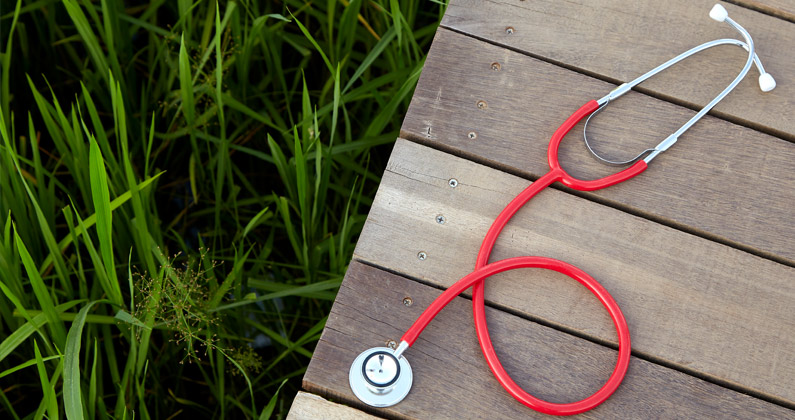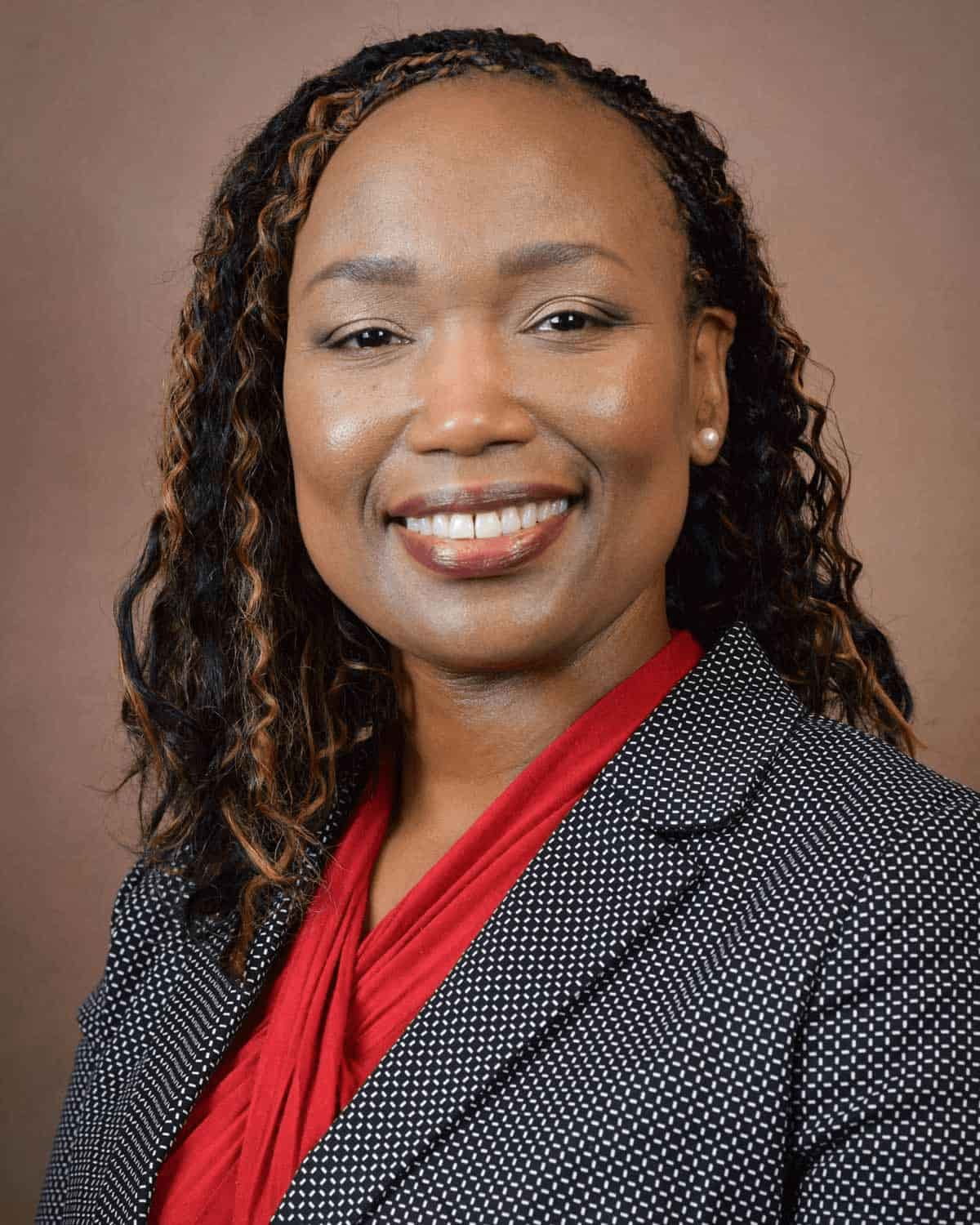Webinar Addresses Impact of COVID-19 on Rural America
June 17, 2020

Dr. Fairley, who teaches microbiology and immunology at PCOM South Georgia, explained
that infections have rapidly spread into suburban and rural settings.
In a webinar hosted by the Philadelphia College of Osteopathic Medicine Office of
Diversity and Community Relations, Assistant Professor Stacie Fairley, PhD, said, “I initially felt protected from COVID-19 because I live in the rural area,
but during these past few months this novel coronavirus has had a tremendous impact
on Southwest Georgia and other rural communities in our country.”
Virus Shifting From Cities to Rural Areas

Dr. Fairley, who teaches microbiology and immunology at PCOM South Georgia, discussed that while initial hot spots of the disease were centered in dense urban
areas, infections have rapidly expanded into suburban and rural settings – in areas
with a population between 2,500 and 50,000 according to The Henry J. Kaiser Family
Foundation (KFF).
According to USA Today, as of May 4, 2020, 86 percent of all rural counties in the
United States had at least one COVID-19 case and about one-third have at least one
COVID-19-related death. At the time of her presentation, KFF reported that the county
with the most cases per capita - Lincoln County, AR - is a metro county, while the
county with the most deaths per capita - Randolph County, GA - is a non-metro county
with 278 deaths per 100,000 people.
Challenges for Rural Health Care
She explained that contributing factors include under-resourced health systems, limited
access to healthcare due to geographical location, inability to social distance, disproportionate
rates of poverty and food insecurity, limited internet access and rural economies
largely built on essential workers, farmers and small businesses.
Dr. Fairley said that “rural hospitals were already struggling to prior to COVID-19
both in the areas of finance and resource. Some rural hospitals are underfunded, understaffed
and under resourced. Now in the days of COVID-19, there is an increase in demand and
price for equipment such as ventilators or personal protective equipment (PPE). These
rural hospitals are unable compete with the larger medical facilities when trying
to purchase these items. According to The Cecil G. Sheps Center for Health Services
Research, over 130 hospitals across the country have closed during the past decade,
and this pandemic could result in more rural hospital closures during a time when
our country critically needs them.”
She added, “Unlike in past instances of natural disasters, overburdened rural hospitals
can't lean on big-city medical centers for help when those organizations are also
struggling. This pandemic has truly highlighted the historical issues that have been
in rural America and other communities for a long period of time prior to COVID-19.”
Rural Communities Cannot Easily Shut Down
Dr. Fairley explained that some rural community homes are composed of multigenerational
families, which makes it difficult to practice social distancing. Residents in rural
communities often have a higher prevalence of comorbidities such as diabetes, arthritis,
heart disease, etc., thereby making them more vulnerable to COVID-19. Furthermore,
many residents are essential workers with no health insurance, limited access to healthcare
and face food insecurities. She added, “Many are unable to take time off work if they
become sick, which makes them less likely to seek treatment. Even with telemedicine,
some lack internet access. Additionally, for some essential workers language barriers
prevent them from receiving and understanding information about the virus.”
“Rural America is largely built on essential workers, farmers and small businesses,”
Dr. Fairley said. “Rural economies often fare worse during recessions and have a harder
time bouncing back.” Statistics from the Center on Rural Innovation show that small
businesses provide about 35 percent of employment in rural towns. As an example, Dr.
Fairley explained that Smithfield Foods, a meat packing facility in Sioux Falls, SD,
closed temporarily due to the pandemic. As reported by The Omaha World-Herald, the
business recently had 600 employees who tested positive for COVID-19, and 40 percent
of diagnosed cases in South Dakota were linked to this facility. The closure of facilities
such as Smithfield could have a cascading effect on this community and the economy.
Economic Relief for Rural Counties
But there is hope on the horizon, according to Dr. Fairley and research provided by
BKD and NPR. “The Coronavirus Aid Relief, and Economic Securities Act (CARES) was
created to provide assistance and healthcare response for individuals, families and
businesses affected by the pandemic,” she said. “The first CARES Act did not specifically
allocate funds to rural areas, instead it allocated funds to areas with a population
of 50,000 or more, but this next one does.”
Dr. Fairley explained that allocations will be distributed to agricultural producers
and rural hospitals. She said the CARES act will also provide funds to rural residents
for broadband internet access for telemedicine.
Dr. Fairley said that from a personal standpoint, the pandemic has caused her to make
many adjustments.
“It’s not just affecting Moultrie – it’s affecting the world,” she said. “We know
we have to sacrifice and adapt.”
About PCOM South Georgia
In 2019, Philadelphia College of Osteopathic Medicine (PCOM), a premier osteopathic
medical school established in 1899, extended its commitment to the Southeast by establishing
PCOM South Georgia. An additional teaching location in Moultrie, Georgia, PCOM South Georgia offers both
a full, four-year medical program leading to the Doctor of Osteopathic Medicine (DO)
degree and a Master of Science in Biomedical Sciences. PCOM is a private, not-for-profit
institution that trains professionals in the health and behavioral sciences fields.
Joining PCOM Georgia in Suwanee in helping to meet the healthcare needs of the state, PCOM South Georgia
focuses on educating physicians for the region. For more information, visit pcom.edu or call 229-668-3110.
Contact Us
For general media inquiries, please contact the Office of Marketing and Communications
at 215-871-6300 or communications@pcom.edu. Visit our media relations page to view contact information for public relations personnel.
Connect with PCOM South Georgia



